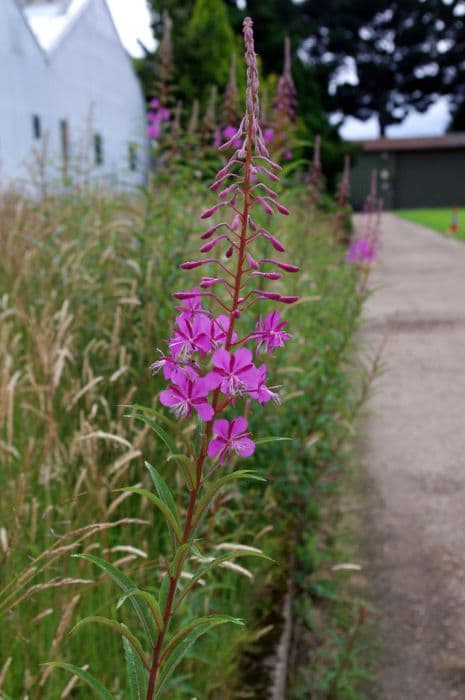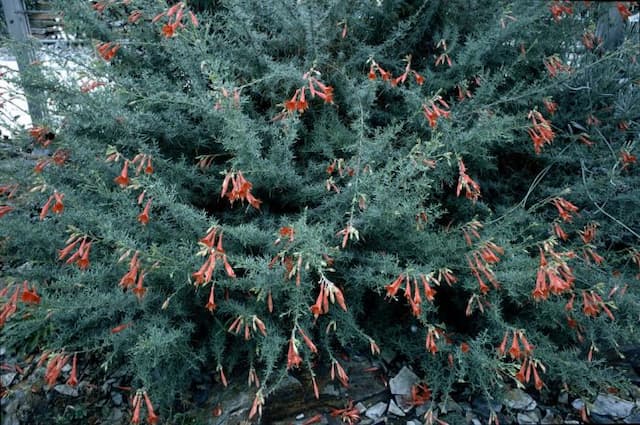Fuchsia Fuchsia 'Eden Rock' (d)

ABOUT
Fuchsia 'Eden Rock' is a captivating ornamental plant characterized by its striking flowers and foliage. The blossoms of this plant are particularly exquisite, featuring a unique teardrop shape that hangs elegantly from the stems. Each flower is a combination of bold colors, typically with a deep purple or pink outer layer that gracefully envelops the inner petals, which are often a contrasting shade of lighter pink or white. These pendulous flowers have long, slender sepals that taper gracefully from the tips, adding to the overall delicate appearance of the blooms. Emerging from the center of the flowers are long stamens with prominent, often vibrantly colored anthers that add an extra touch of drama to each bloom. The leaves of Fuchsia 'Eden Rock' are equally striking, exhibiting a rich green hue that creates a lush backdrop for the flowers. They have a slight gloss on their surface and may have serrated or softly scalloped edges, imparting a textured look to the foliage. The leaves are usually oval or slightly elongated, with prominent veining that is sometimes noticeable against the leaf's surface. Overall, Fuchsia 'Eden Rock' presents a stunning display of vivid colors and graceful forms, making it a favorite for gardeners who wish to add a touch of elegance to their gardens or outdoor spaces.
About this plant
 Names
NamesSynonyms
Lady's Eardrops, Fairy Bells
Common names
Fuchsia 'Eden Rock'
 Toxicity
ToxicityTo humans
Fuchsia 'Eden Rock' is not considered toxic to humans. Therefore, ingesting this plant is not likely to cause poisoning or adverse health effects.
To pets
Fuchsia 'Eden Rock' is generally considered non-toxic to pets as well. Ingesting parts of this plant should not result in serious poisoning or toxicity symptoms in pets. However, consumption of non-food items can sometimes cause gastrointestinal upset in some animals.
 Characteristics
CharacteristicsLife cycle
Perennials
Foliage type
Deciduous
Color of leaves
Green
Flower color
Mixed
Height
1-2 feet (30-60 cm)
Spread
1-2 feet (30-60 cm)
Plant type
Shrub
Hardiness zones
9
Native area
Central America
Benefits
 General Benefits
General Benefits- Attractive Flowers: Fuchsia 'Eden Rock' produces beautiful, pendulous flowers that are highly ornamental, adding aesthetic value to gardens and living spaces.
- Hummingbird Magnet: The blooms of this plant attract hummingbirds, offering opportunities for wildlife observation and pollinator support.
- Shade Tolerance: Fuchsias, including 'Eden Rock', generally tolerate partial shade, making them suitable for garden areas that don't receive full sun.
- Continuous Blooming: Fuchsia 'Eden Rock' can bloom throughout the growing season, providing long-lasting color and interest in the garden or container plantings.
- Versatile Planting: This variety can be planted in containers, hanging baskets, or directly in the garden, offering versatile uses in landscaping and home gardening.
- Instant Color Boost: The bright, vivid colors of its flowers provide an instant boost of color to any setting, uplifting the mood and enhancing the environment.
 Medical Properties
Medical PropertiesThis plant is not used for medical purposes.
 Air-purifying Qualities
Air-purifying QualitiesThis plant is not specifically known for air purifying qualities.
 Other Uses
Other Uses- Fuchsia 'Eden Rock' can be used as a natural dye for fabrics, offering a range of pink to purple hues depending on the mordant used.
- Incorporating the flowers into ice cubes can add a touch of elegance and color to summery drinks and cocktails.
- The plant can act as a living mulch, covering the soil in garden beds to help retain moisture and suppress weeds.
- It can serve as a floral arrangement in miniature gardens or fairy gardens due to its delicate, drooping flowers and compact size.
- Fuchsia 'Eden Rock' can be used in educational settings, such as botanical studies, to demonstrate the attraction of pollinators.
- The branches and blooms can be used in arts and crafts, such as making bookmarks or pressing flowers for decorative purposes.
- It can be trained to grow onto structures as a form of living art, creating patterns or designs on trellises or garden walls.
- The nectar-rich flowers can be used to make a natural, floral-flavored syrup for use in desserts or beverages.
- Culinary enthusiasts might use the edible flowers as a decorative and flavorful garnish in salads or on cakes.
- As a photography subject, the vibrant and unique blooms of the Fuchsia 'Eden Rock' can offer a vivid focus for macro and garden photography.
Interesting Facts
 Feng Shui
Feng ShuiThe Fuchsia is not used in Feng Shui practice.
 Zodiac Sign Compitability
Zodiac Sign CompitabilityThe Fuchsia is not used in astrology practice.
 Plant Symbolism
Plant Symbolism- Elegance and Grace: The Fuchsia 'Eden Rock' is often associated with elegance and grace because of its exquisite hanging blossoms and delicate appearance, making it a symbol of sophistication and tasteful beauty.
- Good Taste: As it’s often chosen for its unique color combination and form, Fuchsia 'Eden Rock' can represent the owner’s good taste and a sense of refinement.
- Confiding Love: In the language of flowers, fuchsias are sometimes connected with confiding love. The hanging blooms can be seen as a delicate whisper of affection and trust.
- Amiability: The plant's vibrant flowers and friendly appearance, often attract hummingbirds, symbolizing an amiable energy and a harmonious environment.
 Water
WaterLady's ear drops should be watered enough to keep the soil consistently moist but not soggy. During the growing season, water the plant generously when the top inch of soil feels dry, which generally means watering once or twice a week, depending on the climate and indoor conditions. Always use lukewarm water and water directly onto the soil to avoid splashing the leaves. Each watering session should provide enough water to thoroughly saturate the soil; for a regular-sized pot, this means typically between 8 to 16 ounces of water.
 Light
LightLady's ear drops thrive in bright, indirect sunlight. The best spot for this plant is near a window that receives morning sunlight but is shielded from the intense afternoon rays, which can cause leaf scorch. A north-facing or east-facing window usually provides the ideal lighting conditions.
 Temperature
TemperatureLady's ear drops prefer a cool to moderate temperature range, ideally between 55 to 75 degrees Fahrenheit. They can tolerate a minimum of about 40 degrees Fahrenheit and a maximum of around 80 degrees Fahrenheit, but the cooler end of their tolerance range promotes better blooms.
 Pruning
PruningLady's ear drops should be pruned to maintain a bushy shape, encourage more blooms, and remove any dead or wilted flowers. Pruning is best done in late winter or early spring before new growth begins. Light pruning can also be done throughout the growing season to shape the plant and promote branching.
 Cleaning
CleaningAs needed
 Soil
SoilFuchsia 'Eden Rock' prefers a well-draining soil mix rich in organic matter. An ideal mix could be one part peat moss, one part perlite, and one part loam with a pH between 6 and 7 for optimal growth.
 Repotting
RepottingFuchsia 'Eden Rock' should be repotted every two to three years or when it becomes pot-bound. Spring is the best time for repotting to give the plant time to establish in the growing season.
 Humidity & Misting
Humidity & MistingFuchsia 'Eden Rock' thrives best in moderate to high humidity levels, preferably between 60% and 70%. Avoid placing the plant in extremely dry conditions.
 Suitable locations
Suitable locationsIndoor
Bright, indirect light with high humidity suits Fuchsia 'Eden Rock' indoors.
Outdoor
Place in dappled light and shelter from strong winds for Fuchsia 'Eden Rock'.
Hardiness zone
10-11 USDA
 Life cycle
Life cycleThe life cycle of the Fuchsia 'Eden Rock' typically begins with germination, which occurs when the seed encounters the right conditions of moisture, temperature, and light. From germination, the plant enters the seedling stage, during which it develops its initial roots and leaves and begins to photosynthesize. As it matures into the vegetative stage, it grows stems, leaves, and a stronger root system, preparing it for flowering. The flowering stage is marked by the development of the distinctive pendulous, tubular flowers that come in a variety of colors, which are usually pollinated by hummingbirds or insects. After pollination, Fuchsia 'Eden Rock' produces small fruits that contain seeds, completing the cycle through seed dispersal. In some climates, this plant is treated as an annual, while in milder climates it can be a perennial, potentially entering a period of dormancy during colder months before resuming growth in the spring.
 Propogation
PropogationPropogation time
Spring-early summer
The most popular method for propagating the Fuchsia 'Eden Rock' is through softwood cuttings. This technique is typically conducted during late spring to early summer when the plant's new growth is tender and flexible. Cuttings should be taken from healthy, disease-free plants, ideally 3 to 5 inches long. Remove the lower leaves and dip the cut end into a rooting hormone powder or gel to encourage root development. The cuttings are then placed in a well-draining soil mix, usually a combination of peat and perlite, and kept in a warm, humid environment out of direct sunlight. It usually takes several weeks for the cuttings to root, after which they can be potted up individually and eventually moved into the garden.









